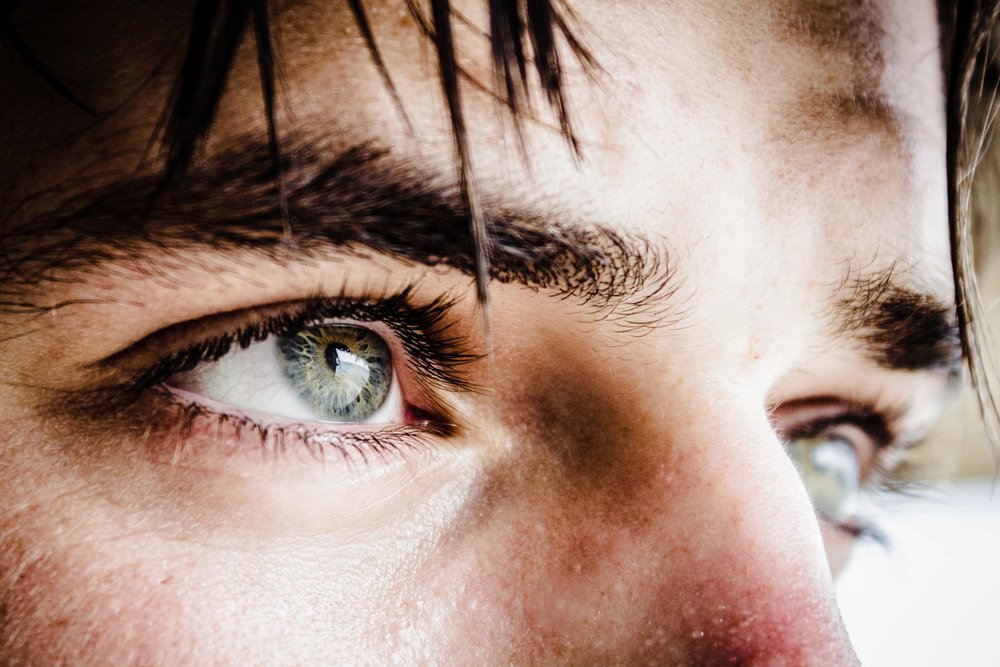Three Things That Can Damage Your Eyesight

Every day, you may encounter forces which can potentially damage your eyes. However, being mindful of these dangers and protecting your vision can mean the difference between early eyesight degradation and preserving reasonably good eyesight into your later years. So, let’s cover a few common things that can damage your eyesight.
Blue Light Emission
We’ve talked a bit about blue light before, but for a quick recap, blue light is the type of light that emits from the screens of most of the electronic devices that we use daily. All our favorite technology – smartphones, laptops, tablets, and LED and TVs all emit blue light.
While blue light emission is also found in more natural environments (the sun emits blue light), studies have shown that spending substantial amounts of time staring at a screen can cause what is called, “light-induced photoreceptor damage” in other mammals. In other words, spending hours staring at a screen every day may very well penetrate your retina, causing damage to the cones and rods of your eyes.
On the bright side (no pun intended), these effects can be partially mitigated by turning down the brightness of your devices. Smartphones and laptops also typically have a “night mode” that shifts the color of your device to a more amber or red color; this does not eliminate blue light emission, but it does reduce it. For those who wear glasses, we also recommend blue light filter lenses to help reduce the amount of blue light reaching your eyes.
UV Rays
UV rays are another topic we’ve covered in the past. But in summary, ultraviolet (UV) rays are invisible electromagnetic rays that emit from the sun. While UV rays are typically associated with damage to the skin, these rays can also cause eye damage and accelerate age-related conditions such as cataracts. According to the Mayo Clinic, a cataract is a condition in which tissues in the lens of your eye start to break down and clump together, causing areas of the lens to begin, “clouding”. As the condition progresses and worsens more of your field of vision begins to cloud, which creates a blurring effect on your eyesight.
A study by the National Eye Institute suggests that when UV rays hit the eye, they can cause “oxidative stress”, which is essentially damage to the proteins in the lens of your eye. Damage to these proteins can accelerate the breakdown of the tissues in the lens, which in turn can accelerate age-related cataracts. Luckily, sunglasses help to prevent the serious damage that can be caused by UV rays. Be sure to wear them year-round because even in the winter, UV rays can cause eyesight damage. For more thoughts on sunglasses check out our tips on sunglasses fashion and prescription sunglasses.
Neglecting Your Contacts
If you wear contacts, you know that they allow you to see without glasses, but they also come with a lot of responsibility. Improper contact care can cause mild to severe eye infections, which unaddressed, can result in serious eye damage or, in some cases, even blindness.
Fortunately, there are a number of ways to keep bacteria and other nuisances from getting into your contact lenses:
- Keep Your Hands and Contacts Clean– We touch hundreds, even thousands, of surfaces a day, and most of them are not sterile. Even our own faces can create hazardous bacteria. For example, Staphylococcus aureus is a common nasal bacterium that can easily be transferred to your eyes. If you touch your runny nose and then touch your eye without washing your hands in between, it’s possible you’ve now transferred that bacteria into directly into your eyes. Keeping your hands clean and your contacts properly sterilized is vital in avoiding a bacterial infection.
- Replace Your Contacts and Contact Case– Your contacts and contact case have a shelf-life, and should be replaced as suggested based on the type. If you put off replacement for too long, you risk the possibility of a bacteria called Pseudomonas aeruginosa taking up residence you contacts lenses and/or their container. This bacteria is more severe than Staphylococcus, and if not treated quickly, it can cause blindness.
- Get Out of the Water!– Swimming pools and hot tubs contain tiny parasites called acanthamoeba that can infect your eyes, and infection is easier when you’re wearing contacts. This infection can cause Keratitis (an eye inflammation), which can cause blurred or decreased vision. Keratitis caused by acanthamoeba can be especially tricky to treat (and in rare cases can require a cornea transplant), so be sure to take your contacts out before you go in the water.
What Else Can I Do?
Eat healthy foods, especially those rich in vitamin C, vitamin E, and beta carotene; these nutrients are extremely important in maintaining good eyesight. Keep track of your cholesterol and blood pressure and try to exercise regularly.
The truth is, your overall health affects your eyes and vision, just like any other part of your body. Aside from that, be sure to get regular eye exams and keep track of any issues you’re having; if you feel like something is wrong, go get it checked out!


